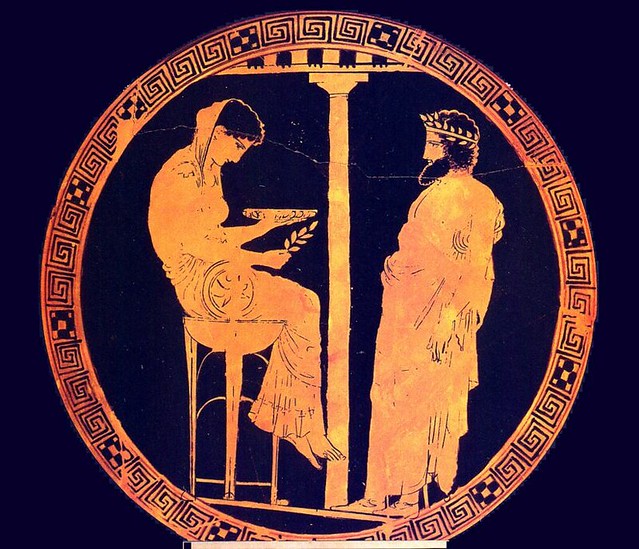I. “The dual fate of Heracles after death, dwelling simultaneously on high with the gods and below in Hades, reflects the Greek notion that we have two different kinds of soul. Thymos is warm, emotional and red-blooded; while psyche is colder, deeper and more impersonal. From thymos’ point of view, the Otherworld is the cold, grey, unsubstantial Hades full of `pottering shades, querulous beside the salt-pits/And mawkish in their wits’. From psyche’s perspective, it is our robust, red-blooded world which is unreal, while Hades who was called Plouton (Pluto), the Rich One, holds all the treasures of the imagination. The shades are not dim ghosts to psyche, but mythic images that erupt out of the Underworld like the laughing Sidhe, their silver eyes flashing. We can begin to understand what Heraclitus meant when he remarked that `Dionysus and Hades are one.’ The god of creative life has a secret affinity with death.
Thymos has been assimilated into the robust ego-consciousness of Western man who believes in no reality other than his own. From the deeper psychic viewpoint, however, ego-consciousness is – as the Neoplatonists noticed – a kind of unconsciousness. We are unaware of reality, claim the Romantics, except in moments of imaginative vision. The Otherworld lies all about us, an earthly paradise – if we would but cleanse `the doors of perception’, as Blake put it, and see the world as it really is, ‘infinite’.”‘
Patrick Harpur, “The Pilosophers’ Secret Fire: A History of the Imagination”
II.”The word ‘thūmos,’ which I translate here as ‘heart,’ expresses in Homeric diction the human capacity to feel and to think, taken together. … Thūmos is the vital force.
Psūkhe – ‘life, life’s breath, spirit, soul, mind,’ … In Homeric Greek this word refers to the essence of life when one is alive and to the disembodied conveyor of identity when one is dead.”
Gregory Nagy, “The Ancient Greek Hero in 24 Hours”

"The deepest core of life is poetry and symbol." - Dane Rudhyar
Like Symbol Reader on Facebook
-
-
Recent Posts
Categories
Archives
Meta













Good analogies. From this perspective it makes me think that psyche, the breath, the pneuma is actually the code word for spirit…
LikeLike
Thank you and I agree with you about psyche and spirit.
LikeLiked by 1 person
Reblogged this on lampmagician.
LikeLike
Pingback: Two Different Kinds of Soul | lampmagician
I see you are reading Philosopher’s Secret Fire – wonderful! I so look forward to your perspectives. There is noone else who’s opinion I would like to hear more.
LikeLiked by 1 person
Thank you, Amy. I got this book on your recommendation and have only started reading it. I think it’s wonderful.
LikeLike
I am so glad. It is a rare book, I enjoyed that I could sink my teeth into it, and it made me feel like all my years of self study down strange twisting alleyways was being rewarded. I do think it peters off a little towards the end, but I don’t feel it detracts significantly from the grand theme and the details of the rest of the book.
LikeLiked by 1 person
Reblogged this on Arrow of awareness.
LikeLike
Great quotes. I love the Neoplatonists and the Romantics. I could spend my days reading Blake, Coleridge, Proclus, and Plotinus.
LikeLiked by 1 person
I am really enjoying that book on the history of imagination, Jeff. You would love it.
LikeLike
I’m sure I would. Right now, I am on a hiatus from book purchasing. I’ll just have to satisfy myself with your posts 😉
LikeLiked by 1 person
“We can begin to understand what Heraclitus meant when he remarked that `Dionysus and Hades are one.’ The god of creative life has a secret affinity with death.”- this is amazing Monika, how you notice this duality in two different figures.
LikeLiked by 1 person
Yes, absolutely! Thank you, Maria.
LikeLike